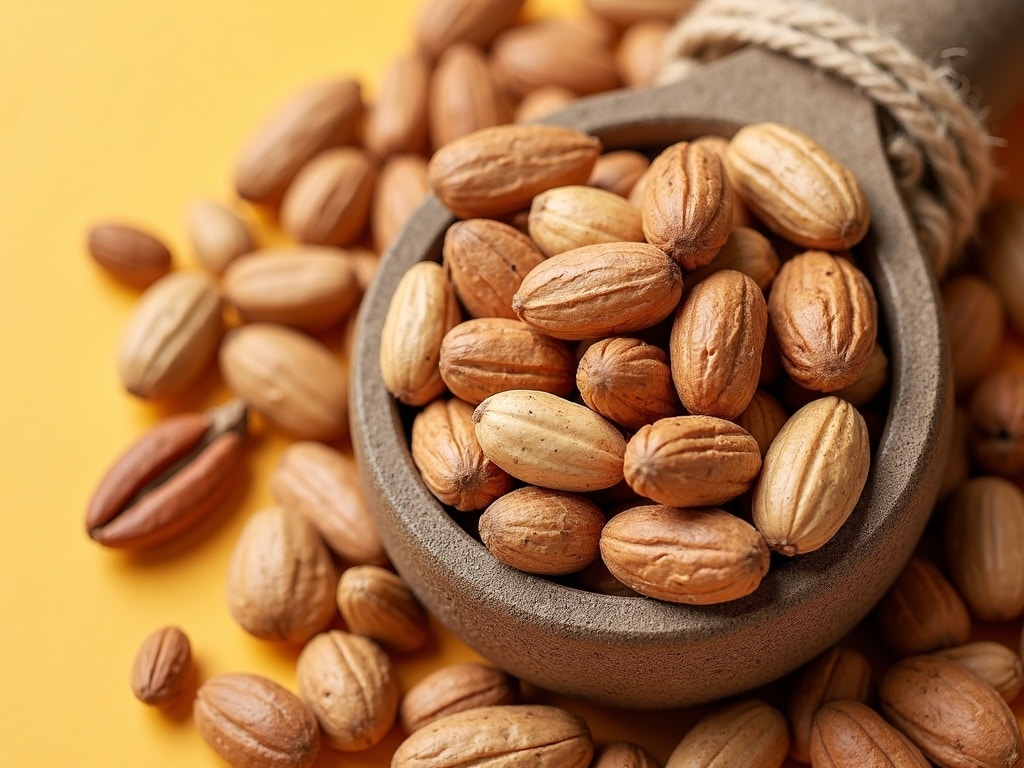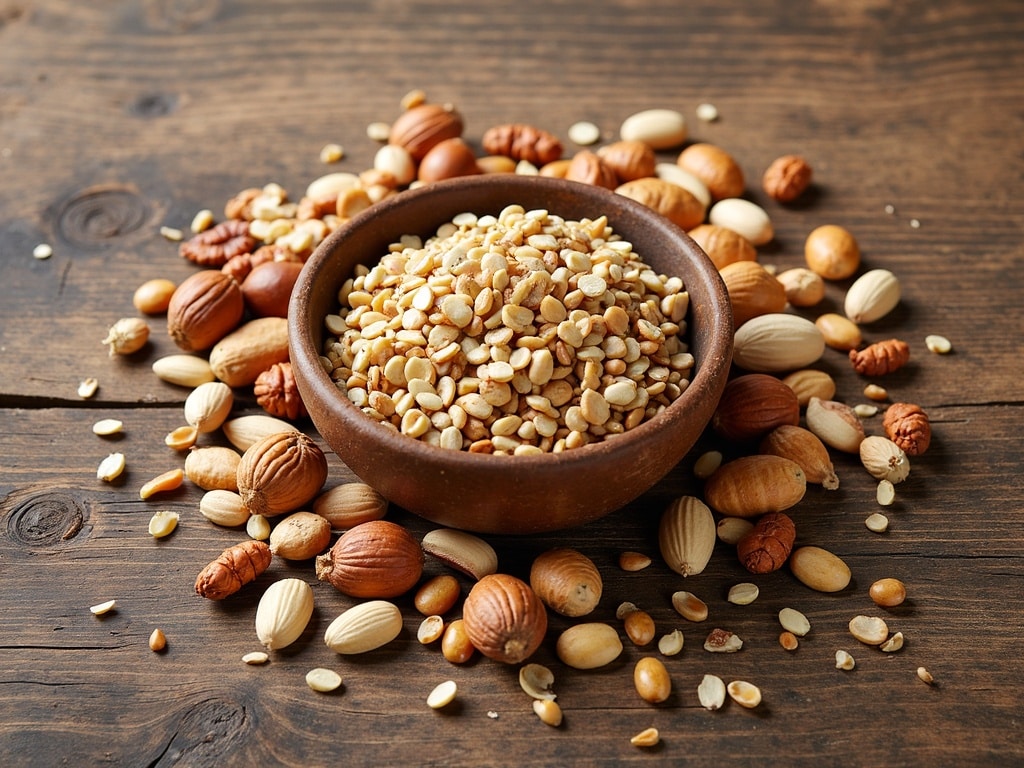Unlock Your Mind's Potential: The Best Nuts and Seeds for Brain Power
In today's fast-paced world, maintaining peak cognitive function is more crucial than ever. We're constantly bombarded with information, and our brains are working overtime to process it all. While factors like sleep, exercise, and mental stimulation are vital, nutrition plays a significant role in brain health. Among the most potent brain-boosting foods are nuts and seeds – tiny powerhouses packed with nutrients that can sharpen focus, enhance memory, and protect against age-related cognitive decline.
Why Nuts and Seeds are Brain Food
Nuts and seeds have long been celebrated for their nutritional value. But what specifically makes them so beneficial for the brain? The answer lies in their rich composition of vitamins, minerals, antioxidants, and healthy fats.
- Healthy Fats: Nuts and seeds are excellent sources of monounsaturated and polyunsaturated fats, including omega-3 and omega-6 fatty acids. These fats are essential for brain cell structure and function, aiding in neurotransmission and overall cognitive performance.
- Antioxidants: The brain is particularly vulnerable to oxidative stress, which can damage brain cells and contribute to cognitive decline. Nuts and seeds are brimming with antioxidants like vitamin E, selenium, and polyphenols, which combat free radicals and protect the brain.
- Vitamins and Minerals: These tiny nutritional powerhouses are loaded with essential vitamins and minerals like vitamin E, B vitamins, magnesium, zinc, and iron, each playing a crucial role in brain health.
Top Nuts and Seeds for a Cognitive Boost
While most nuts and seeds offer some brain-boosting benefits, some stand out as particularly potent. Let's explore some of the best options to incorporate into your diet:
Walnuts: The Brain-Shaped Nut
Walnuts are perhaps the most well-known brain food. Their unique appearance, resembling a tiny brain, is no coincidence. They are exceptionally rich in omega-3 fatty acids, specifically alpha-linolenic acid (ALA), which the body can convert into DHA and EPA, crucial for brain health. Walnuts also boast a high concentration of antioxidants, including polyphenols, which protect against oxidative stress and inflammation in the brain.
Research suggests that walnuts can improve cognitive function, memory, and even mood. Studies have shown that consuming walnuts regularly can enhance cognitive performance in adults and may even delay age-related cognitive decline.
Almonds: Memory and Focus Enhancers
Almonds are a popular and versatile nut packed with nutrients that support brain health. They are a good source of vitamin E, an antioxidant that protects brain cells from damage. Almonds also provide magnesium, which is essential for nerve function and neurotransmitter activity. A deficiency in magnesium can lead to cognitive fog and impaired memory.
Furthermore, almonds contain L-carnitine and riboflavin, nutrients that contribute to energy production within brain cells. This can help improve focus, concentration, and overall mental alertness.
Flaxseeds: Omega-3 Powerhouse
Flaxseeds are a fantastic plant-based source of omega-3 fatty acids, providing a significant dose of ALA, similar to walnuts. While the body's conversion of ALA to DHA and EPA may not be as efficient as with direct sources like fatty fish, flaxseeds are still a valuable addition to a brain-healthy diet, especially for vegetarians and vegans.
Beyond omega-3s, flaxseeds are rich in fiber, which helps regulate blood sugar levels, preventing energy crashes and mood swings that can impair cognitive function. They also contain lignans, potent antioxidants with anti-inflammatory properties that protect the brain.
Pumpkin Seeds: Zinc for Sharp Thinking
Pumpkin seeds, also known as pepitas, are an excellent source of zinc, a mineral crucial for cognitive function and memory. Zinc plays a role in neurotransmitter signaling and protects brain cells from damage caused by free radicals. A zinc deficiency can lead to impaired cognitive performance, difficulty with learning, and memory problems.
In addition to zinc, pumpkin seeds provide magnesium, iron, and antioxidants, further contributing to their brain-boosting benefits.
Sunflower Seeds: Vitamin E for Brain Protection
Sunflower seeds are a readily available and affordable source of vitamin E, a powerful antioxidant that protects brain cells from oxidative stress. Vitamin E is particularly important for maintaining cognitive function as we age. It helps prevent the formation of plaques and tangles in the brain, which are hallmarks of Alzheimer's disease.
Sunflower seeds also contain choline, a nutrient that is a precursor to acetylcholine, a neurotransmitter involved in memory and learning.

Chia Seeds: Sustained Energy for the Brain
Chia seeds are a nutritional powerhouse, providing a sustained release of energy thanks to their high fiber and healthy fat content. This steady energy supply is crucial for maintaining consistent cognitive function throughout the day, preventing brain fog and promoting focus.
Chia seeds are also a good source of ALA omega-3 fatty acids, antioxidants, and essential minerals like magnesium and calcium, all contributing to brain health.
Cashews: Cognitive Function and Mood Regulation
Cashews offer a delightful creamy texture with a nutritional profile that benefits brain health. They are rich in magnesium, which plays a vital role in nerve function and neurotransmitter regulation. Magnesium can help improve cognitive function, reduce anxiety, and promote a sense of calm.
Cashews also provide tryptophan, an amino acid that the body uses to produce serotonin, a neurotransmitter that regulates mood, sleep, and appetite. By supporting serotonin production, cashews can contribute to a more positive and balanced mood, indirectly enhancing cognitive performance.
How to Incorporate More Nuts and Seeds into Your Diet
Adding more nuts and seeds to your diet is easy and delicious. Here are a few ideas:
- Snack Smart: Keep a bag of mixed nuts and seeds on hand for a healthy and satisfying snack between meals.
- Top It Off: Sprinkle nuts and seeds on salads, yogurt, oatmeal, or smoothie bowls for added texture and nutrition.
- Bake with Brainpower: Incorporate nuts and seeds into your baking recipes, such as muffins, breads, and cookies.
- Seed Butters: Enjoy nut and seed butters like almond butter, cashew butter, or sunflower seed butter on toast, apples, or in smoothies.
- Trail Mix Magic: Create your own custom trail mix with your favorite nuts, seeds, dried fruit, and dark chocolate chips.
- Smoothie Boost: Add a tablespoon or two of your favorite seeds to your morning smooth for added nutrients and sustained energy.
Considerations and Potential Downsides
While nuts and seeds offer significant brain-boosting benefits, it's essential to consume them in moderation. They are Calorie-dense, so overeating can lead to weight gain. Additionally, some people may have allergies to specific nuts or seeds. If you have any concerns, consult with a healthcare professional or registered dietitian.
Also, some nuts may be heavily salted or coated in sugary glazes. Opt for raw or lightly roasted options to maximize nutritional value and avoid unnecessary additives. Check out for information on the best healthy snacks to try.
The Takeaway: Fuel Your Brain Naturally
Nuts and seeds are a delicious and convenient way to support brain health and cognitive function. By incorporating a variety of these nutritional powerhouses into your diet, you can provide your brain with the essential nutrients it needs to thrive. From walnuts and almonds to flaxseeds and pumpkin seeds, there's a nut or seed to suit every taste and preference. So, start fueling your brain naturally and unlock your mind's full potential!

